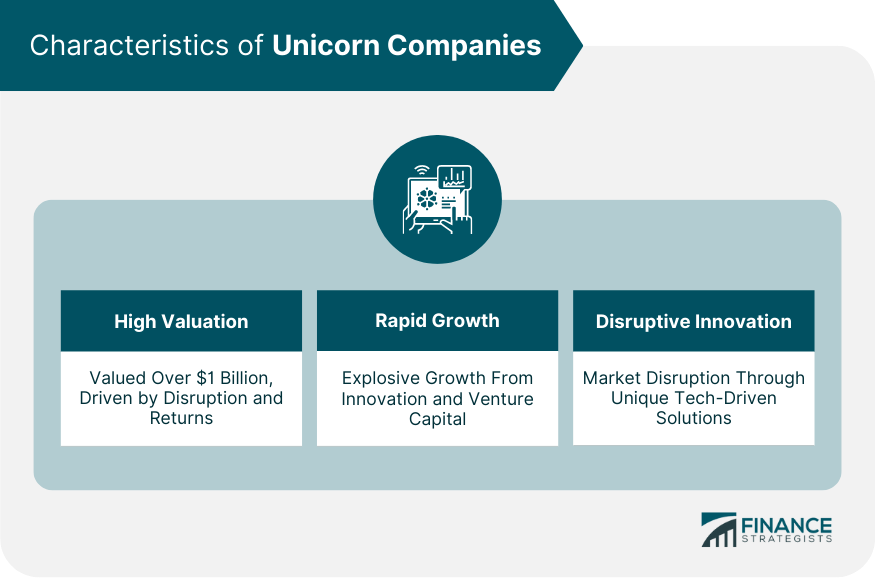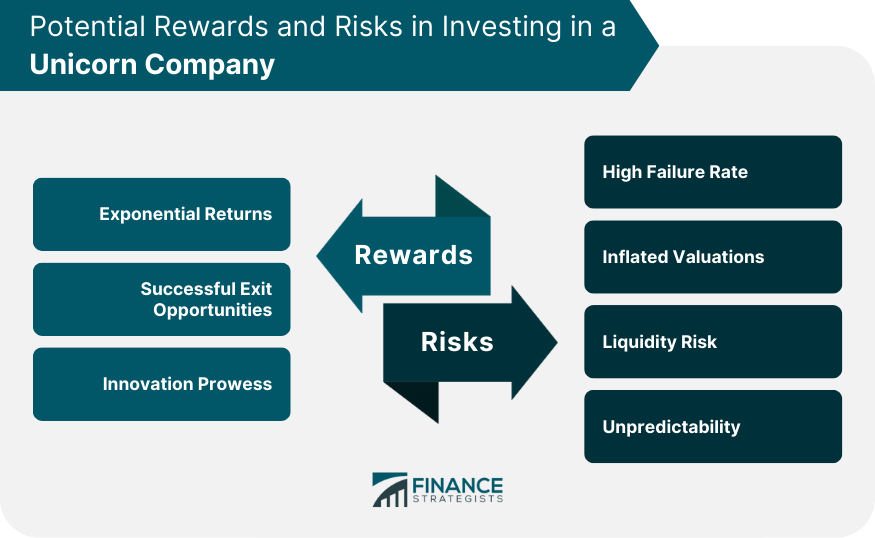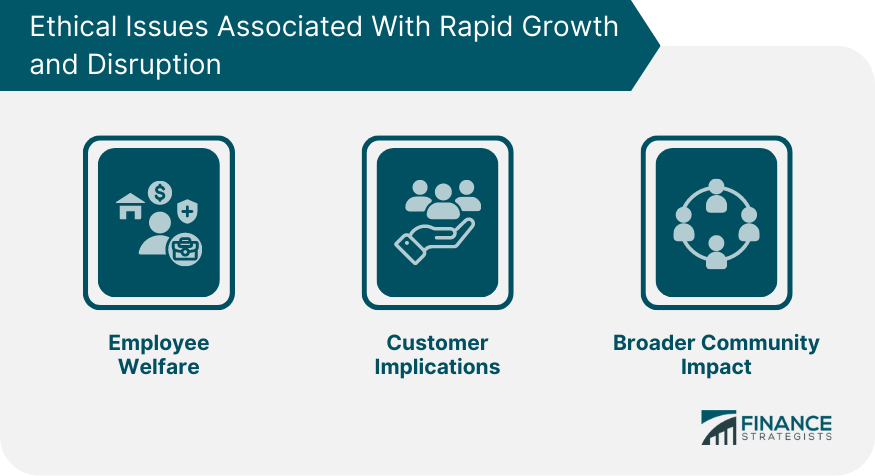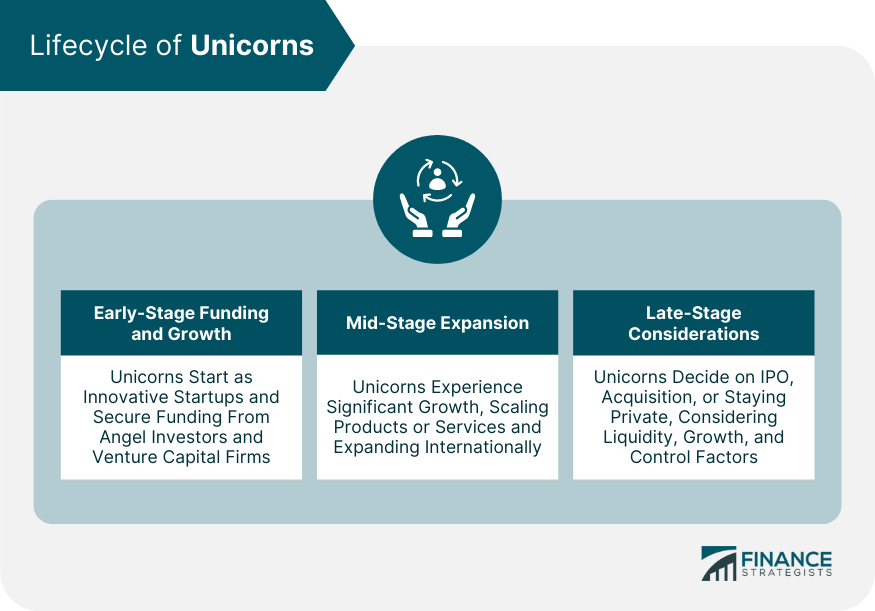A unicorn refers to a privately held startup company valued at over $1 billion. The term was coined in 2013 by venture capitalist Aileen Lee, choosing the mythical animal to represent the statistical rarity of such successful ventures. Unicorn companies are characterized by their high valuations, which are primarily based on their potential for disruptive innovation and rapid growth rather than their current financial performance. These startups often provide unique solutions to significant problems or fill gaps in the market, enabling them to scale quickly and attract a substantial user base. Examples of well-known unicorns include Uber, Airbnb, and SpaceX. Like other unicorns, these companies have disrupted their respective industries with innovative technology or business models. Unicorns span various sectors, from technology and healthcare to finance and e-commerce. The rise of unicorns represents a significant shift in the business and investment landscape. They substantially impact job creation, economic growth, and industry transformation. Unicorn companies represent a distinct breed of startups. They are not defined merely by their business type or industry but by a set of shared characteristics that set them apart. Understanding these can provide valuable insights into their success's underpinnings and influence in the entrepreneurial ecosystem. The most defining characteristic of unicorn companies is their high valuation, which typically exceeds one billion dollars. This valuation is often based more on the company's potential for future growth and profitability rather than its current financial performance. Investors are willing to value these companies so highly because they believe in their capacity to disrupt industries, capture significant market share, and deliver substantial returns in the future. These valuations are often derived from funding rounds. Investors pay a certain price for company shares, which is then extrapolated to the company's total share capital to derive a post-money valuation. Another hallmark of unicorn companies is their capacity for rapid growth. Unlike traditional businesses, which might grow steadily over time, unicorns often experience explosive growth rates. This growth is largely due to their innovative ideas, products, or services that solve significant problems or fill gaps in the market. Coupled with effective execution, these factors enable unicorns to scale and attract substantial user bases quickly. The aggressive growth strategies adopted by unicorns often require significant investment, which is typically funded by venture capital. These funds are used to fuel various aspects of the business, from product development and talent acquisition to marketing and international expansion. One of the defining traits of unicorn companies is their ability to disrupt existing markets or create entirely new ones through innovation. They challenge the status quo, question established practices and norms, and drive industry transformation by offering unique solutions to existing problems. Often, this disruption is technology-driven. Many unicorns leverage technological advancements to develop superior products or services or deliver existing products or services in a novel, more efficient, or customer-friendly way. This innovation can create significant user value and is typically a key driver of unicorns' rapid growth and high valuations. Unicorn companies typically undergo several rounds of funding as they progress and grow. These funding rounds can be classified into stages: seed, Series A, B, C, and so on. With each round, new investors often come on board, bringing additional capital to the table. As a company advances through these rounds, its valuation generally increases, reflecting its growth, potential, and the amount of capital it has secured. A company's valuation at each stage is a reflection of various factors. These include the company's growth rate, the size of the market it addresses, its competitive position, and its potential for profitability. The valuation also incorporates the company's risk and return profile from the investors' perspective. It's important to note that the valuation of a unicorn company is often the subject of negotiation between the startup's founders and the investors. These valuations might not always correspond to the company's current financial performance but rather its potential future performance. Unicorns can have significant economic implications at a macroeconomic and microeconomic level. They attract substantial investment, often from across borders, thus contributing to capital inflow and investment activity. This can positively impact the broader economy, stimulating economic growth. Moreover, unicorns often create many jobs as they grow, contributing to employment rates. They also frequently lead to substantial wealth creation when they go public or get acquired, benefiting their employees who hold stock options and the investors who backed them. Unicorns also exert an influence on the markets they operate in. Their disruptive business models can lead to increased competition and innovation, benefiting consumers by giving them more choices and lowering prices. Investing in unicorns can be exhilarating, given their potential for exponential growth and substantial returns. If a unicorn company continues its growth trajectory and becomes a market leader or disruptor, early investors can enjoy exponential returns on their initial investments. Unicorns often become targets for acquisitions by larger corporations or may choose to go public through an IPO, both of which can provide substantial financial windfalls for early investors. Investing in unicorns often means investing in innovation and new technology. This can allow investors to be part of groundbreaking changes in an industry. These investments are with significant risks. Below are some key considerations for investors contemplating an investment in a unicorn company: The startup environment is notoriously risky. Many startups fail, and unicorns are not immune despite their high valuations and promises of disruption. Unicorn valuations are often high due to their growth potential. However, there is a risk that these valuations are overly optimistic or based more on hype than on fundamental financial performance, leading to the possibility of a significant correction. Investments in unicorns are usually less liquid than investments in publicly-traded companies. This means investors may be unable to sell their stake if they need to easily. The markets and industries that unicorns operate in can be highly volatile and subject to rapid change. This unpredictability can significantly impact the success of a unicorn and, by extension, the investors' returns. To navigate these risks and rewards, potential investors should conduct thorough due diligence, understand the unicorn's business model and growth strategy, and, most importantly, ensure they have a diversified investment portfolio to mitigate potential losses. One common criticism of unicorn companies revolves around their valuations. Critics argue that these valuations are often inflated, driven by hype, speculation, and the fear of missing out on the next big thing rather than a startup's financial performance or realistic growth prospects. This hyperinflation of valuations can fuel economic bubbles. Economic bubbles occur when the prices of assets, in this case, startup valuations, rise rapidly to levels far beyond their intrinsic value. When the bubble eventually bursts, the valuations can plummet, leading to significant financial losses for investors. This sudden crash can lead to financial crises and severely impact the broader economy. The dot-com bubble of the late 1990s and early 2000s provides a stark illustration of this risk Another criticism directed towards unicorns pertains to their sustainability. In their quest for rapid growth and market dominance, many unicorns burn through cash at an alarming rate. They often prioritize growth over profitability, investing heavily in areas like product development, marketing, and customer acquisition. While this aggressive growth strategy can lead to rapid expansion and high valuations, critics question its sustainability. Many unicorns operate at a loss for years; there is no guarantee that they will ever become profitable. If a unicorn fails to achieve profitability before its funding runs out, it could be forced to shut down or sell itself, often at a fraction of its previous valuation. Ethical issues associated with unicorn companies have also come under scrutiny. Some startups may overlook important ethical considerations in their race to scale rapidly and disrupt industries. Employee Welfare: The intense pressure to grow quickly can often lead to a demanding work environment. Reports of long working hours, high stress, and burnout are common in the startup world. Customer Implications: Unicorns can sometimes overlook user privacy and data security in their quest for rapid growth, leading to breaches and misuse of sensitive customer information. Broader Community Impact: Some unicorns, especially those in sectors like housing and transportation, have been criticized for disrupting communities and local economies without adequately considering the social consequences. While unicorns bring significant potential for disruption and high returns, they are also accompanied by valid criticisms. Stakeholders, from investors to regulators, must carefully consider these criticisms to ensure a balanced approach that facilitates innovation while mitigating the associated risks. The lifecycle of a unicorn begins much like any other startup. These companies start with an innovative idea and a team passionate about bringing it to life. However, their potential for rapid growth and significant market disruption sets unicorns apart early on. Their business models or technologies often represent substantial advancements or novel approaches that have the potential to reshape entire industries. During this early stage, attracting funding is a crucial objective. Unicorns often excel at this, securing seed funding, Series A funding, or other early-stage investment. This capital is usually provided by angel investors, venture capital firms, or sometimes through government grants and programs. It is used to develop the product or service further, conduct market research, and initiate growth strategies. As unicorns enter their mid-stage, they typically undergo significant expansion. This growth often involves scaling their products or services to a wider market or refining their offerings based on initial user feedback and market response. At this stage, international expansion may also be on the cards. As unicorns have high growth ambitions, they often look beyond domestic markets to increase their user base and revenue. Series B, C, or later funding rounds fuel this expansion. These funding rounds often involve larger investment sums and can include a mix of venture capital firms, private equity investors, and sometimes strategic corporate investors. As unicorns move into the late stage of their lifecycle, they face several crucial decisions about their future. One of the primary considerations is the path to liquidity, which can take several forms. Many unicorns choose to go public through an IPO. This move provides liquidity for early investors and employees with stock options. It also raises substantial capital that can be used for further growth. However, going public comes with increased regulatory scrutiny, demands for transparency, and pressure from shareholders to deliver consistent growth. Another option is being acquired by a larger company. An acquisition can provide a profitable exit for early-stage investors and the founders. However, this route often comes with the risk of the company losing its identity or the original vision being compromised. Staying Private: Some unicorns choose to stay private for longer, benefiting from the flexibility and control that this provides. While this can delay liquidity for investors and employees, it allows the company to continue growing at its own pace without the pressures of being a public company or a subsidiary of a larger entity. Each of these paths carries its unique set of challenges and opportunities. The optimal choice depends on various factors, including the company's financial performance, market conditions, the objectives of the founders and investors, and the company's long-term strategy. Unicorn companies represent a rare breed of startups valued at over $1 billion based on their potential for disruptive innovation and rapid growth. They are characterized by high valuations, rapid growth fueled by venture capital, and the ability to disrupt existing markets through innovation. Unicorns have significant economic implications, contributing to job creation, wealth generation, and market competition. However, they also face criticisms, including concerns about inflated valuations, sustainability, and ethical considerations. Investors in unicorns have the potential for exponential returns but also face risks such as high failure rates and market unpredictability. Understanding the lifecycle of unicorns, from early-stage funding to potential exit opportunities, is crucial for investors and stakeholders. By carefully considering the characteristics, economic impact, criticisms, and lifecycle of unicorns, we can better appreciate their significance in the global economy and make informed decisions in this evolving business landscape.What Is a Unicorn?
Characteristics of Unicorn Companies
High Valuation
Rapid Growth
Disruptive Innovation

Funding Rounds and Valuation of Unicorns
Economic Implications of Unicorns
Rewards for Investors
Exponential Returns
Successful Exit Opportunities
Innovation Prowess
Risk for Investors
High Failure Rate
Inflated Valuations
Liquidity Risk
Unpredictability

Criticisms of Unicorns
Unrealistic Valuations and the Potential for Bubbles
Sustainability Concerns
Ethical Issues Associated With Rapid Growth and Disruption

Lifecycle of Unicorns
Early-Stage Funding and Growth
Mid-Stage Expansion
Late-Stage Considerations: IPO, Acquisition, or Staying Private

Conclusion
Unicorn FAQs
A unicorn company is a privately-held startup valued at over one billion dollars.
Venture capitalist Aileen Lee coined the term "unicorn" in 2013.
Venture capital plays a crucial role by providing the necessary funding for startups to scale rapidly, thereby increasing their valuation.
Unicorn companies often use technology and the internet to disrupt traditional industries, creating new business models and solutions.
While unicorns offer high potential returns, they also carry substantial risks, including inflated valuations, sustainability issues, and the inherent unpredictability of startup success.
True Tamplin is a published author, public speaker, CEO of UpDigital, and founder of Finance Strategists.
True is a Certified Educator in Personal Finance (CEPF®), author of The Handy Financial Ratios Guide, a member of the Society for Advancing Business Editing and Writing, contributes to his financial education site, Finance Strategists, and has spoken to various financial communities such as the CFA Institute, as well as university students like his Alma mater, Biola University, where he received a bachelor of science in business and data analytics.
To learn more about True, visit his personal website or view his author profiles on Amazon, Nasdaq and Forbes.











